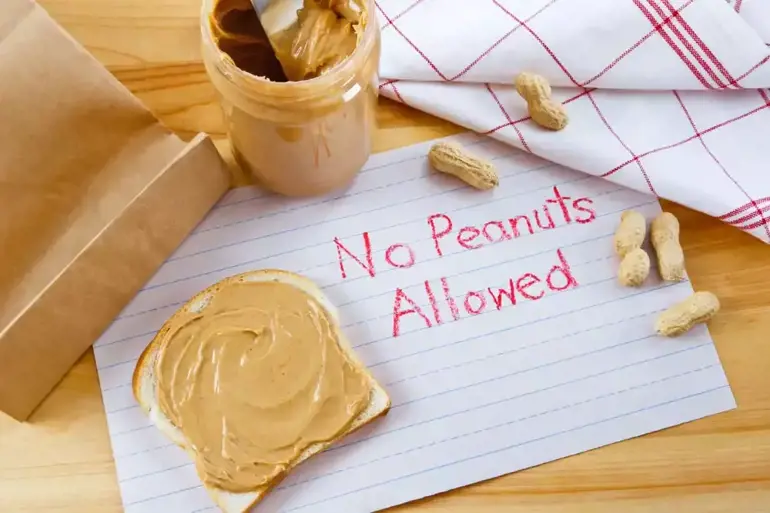Has your baby started to reach for your fork? Or perhaps they’re watching your every mouthful like a hawk? If the answer is yes and they are four to six months old, then your baby may well be ready for solid food. That’s right, it’s time to purchase a highchair, buy a bib and get ready for some mess (and fun!).
For many parents, the thought of introducing those first solids to your baby is terrifying, so we’ve pulled together a list of signs which indicate readiness and some tips on where to begin on the solid foods journey.
Here are some signs that your baby is ready for solids:
-
can sit up properly with the support of their highchair or booster seat and doesn’t slump in their seat (as this can increase the risk of choking)
-
has good head and neck control
-
shows an interest in food – for example, they look at what’s on your plate
-
reaches out for your food
-
opens their mouth when you offer them food on a spoon
-
no longer has a tongue thrust reflex (which means your baby no longer sticks their tongue out repeatedly)
If you’re a first-time parent, you may well be asking “How do I introduce solid foods? Where do I begin?” It can be daunting and the plethora of conflicting advice online is overwhelming. Try to keep it simple and remember, the process should be enjoyable above all else. Afterall, your little one is tasting food for the very first time. We’ve answered some FAQ’s to help you below.
What foods do I serve first?
You can introduce solid food to your little one in any order, however it is important to focus on iron rich foods where possible. Iron is an important nutrient for your baby between six to twelve months and it’s common for iron reserves to deplete during this time when babies are going through a period of huge growth and development. Keep in mind the recommended iron intake for babies is 11mg per day. As such, pureed meats, poultry, beans and iron fortified infant cereals are recommended when introducing solids. A great way to increase iron absorption is to pair iron-rich foods with vitamin c.
Can I mix foods together?
Try to introduce only one new solid food to your baby at a time initially and then as they adjust to a new taste you can be more experimental and mix foods together (i.e. pureed apple with infant cereal).
Should the food be pureed? Or can I follow baby-led weaning?
The conversation regarding pureed solids vs baby-led weaning is often hotly debated but what’s most important when deciding which approach you’ll take is to do what’s right for you and your baby. It’s also crucial that you consider developmental milestones which can vary between children; the gag reflex, sucking and swallowing, tongue control and movement, and back and neck strength.
A traditional approach would see you introduce your baby to softer textures initially i.e. pureed or mashed food from around six months of age. As your little one develops chewing and motor skills, you can start to offer them finger food like soft pieces of fruit, toast, vegetable muffins, etc.
If you prefer to follow the approach of baby-led weaning then you’ll skip the pureed food process altogether in favour of fingerfood. Some carers prefer this approach as it requires less preparation and can offer numerous benefits.
Registered dietician Clancy Cash Harrison, author of Feeding Baby discusses how baby-led weaning helps babies learn to self-feed and fine-tune motor development. She says, "Baby-led weaning supports the development of hand-eye coordination, chewing skills, dexterity, and healthy eating habits. It also offers babies an opportunity to explore the taste, texture, aroma, and colour of a variety of foods."
What time of the day is best to introduce your baby solid foods?
It is best to introduce solids when your baby is calm and settled – approximately 30 mins after a feed of breastmilk or formula is ideal. They will still have room in their little tummies but won’t be distracted by their hunger for milk.
How much food do I offer?
When you’re first introducing them to a new food, start with 1-2 teaspoons once a day. Initially your baby might not swallow much and the experience will be more of a taste-test. Remember this is all new for your little one so they may take a while to get the hang of it. Gradually increase the amount you’re offering over the following weeks and months. By 12 months of age, they should be eating three meals a day plus breastmilk or formula.
Is it best to introduce allergy-prone foods (ie. nuts, eggs, fish) early on?
The thought of a potential allergy can be concerning but the sooner you try allergy prone foods (in a safe, supported environment), the better. It’s always a good idea to talk to your medical practitioner with any concerns and check out the Australasian Society of Clinical Immunology and Allergy website for further info. The general recommendation is to offer your baby well cooked egg and smooth peanut butter/paste regularly (twice weekly), starting before 12 months of age. Delayed introduction of these foods has been shown to increase the chance of developing food allergy.
How will my childcare provider support me with introducing solid foods to my baby?
We spoke to Meegan Black, Centre Director at Sparkways Early Learning in Carrum Downs who advised that their Educators and amazing Chef work closely with families to create an individualised menu for each child when they are starting solids or new foods. Most centres will happily accommodate your family’s wishes when it comes to food preferences at this important stage of development.
Meegan says, “The frequent conversations help everyone understand what the child has had, has not had and what they might not have available at home but we can provide for them at our Centre. This ensures we are opening up the variety of food and nutrition the child has access to. It also allows us to broaden our menu using shared meal ideas from other families within the centre.”
Are there any foods my baby shouldn’t eat?
Be sure to avoid the following foods/drinks for infants:
-
cow's milk as their main milk drink from 6 to 12 months
-
reduced-fat milk or unpasteurized milk and dairy foods
-
whole nuts, popcorn, hard sweets, whole grapes, raw carrot, raw apples or other hard fruit and vegetables
-
honey — this can contain spores of botulism and should not be given to babies under 12 months
-
cordial, soft drink or sweet drinks
-
tea, coffee or energy drinks
Resources:
Nip Allergies in the Bud Website
Baby-led Weaning Finger Food Recipes


































